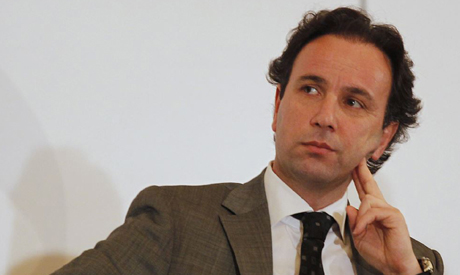
File: Khaled Khoja, a Syrian National Council (SNC) member (Photo: Reuters)
Syria's exiled opposition chief told AFP he wants to pull together the country's divided dissidents to end the nearly five-year bloodbath, before meeting the French president for the first time Thursday.
Khaled Khoja, who has headed the main National Coalition since January, also blamed President Bashar al-Assad for the lightning rise of jihadist groups who have taken over large swathes of Syria and Iraq.
Softening the coalition's previous refusal to work with Damascus-tolerated opposition groups, 50-year-old Khoja said he wants "a common ground" with other dissidents, and to "establish a new framework for the Syrian opposition."
The interview comes less than a week after the exiled coalition met in Paris with the domestic National Coordination Committee for Democratic Change (NCCDC).
For the first time in Syria's war, the coalition and the NCCDC agreed on a draft roadmap for future negotiations with Assad's regime.
In Paris, the two main opposition bodies agreed that the main goal of any future peace talks would be "to establish a civil, democratic, pluralistic system" in Syria.
Khoja said the meeting was "a very good start" and that he will work with all opponents seeking to "establish a new Syria based on collective rights and individual freedom".
Before meeting French President Francois Hollande, a main backer of the Syrian revolt, Khoja told AFP late Wednesday that Assad must go, but that his ouster was not a pre-condition for any future peace talks.
He also said that while the opposition's main demand is Assad's ouster, it wants to "preserve the Syrian state".
"Unfortunately, the state is being demolished by the regime. Half of the hospitals have been demolished. More than half the schools have been demolished," said Khoja, who has lived in Turkey since the 1980s, after being imprisoned by the regime twice over his political activism.
The coalition was established in Doha in 2012. It is recognised by dozens of states and organisations as a legitimate representative of the Syrian people.
It has entered into two failed rounds of negotiations with the regime, and has faced frequent accusations of being disconnected from the situation inside Syria.
The opposition leader meanwhile blamed Assad for the rise of jihadists such as the brutal Islamic State (IS) group, which is known for its horrific execution videos and mass kidnappings of minority groups in Syria and Iraq.
"The roots of terror," he said, are "Bashar's intelligence services."
Khoja also said the West should have done more to stop Assad early in the conflict, in order to stem the rise of jihadist groups.
"Our Western friends have been informed since the end of 2011 that Al-Qaeda (members) were being released from (regime) jails," he said.
"Unfortunately, our Western allies just watched... and we ended up where we are now, fighting ISIS, the most horrible terrorist organisation in history," he added, using another acronym for IS.
Syrian opposition groups and activists have frequently accused Damascus of allowing the spread of jihadist groups such as IS, as a way to give credence to its claim that there was never a pro-democracy movement seeking Assad's ouster.
The conflict, which has killed 210,000 people and forced half the population to flee their homes, began as a peaceful uprising in March 2011, but later morphed into a savage war after Assad unleashed a crackdown against dissent.
Short link: